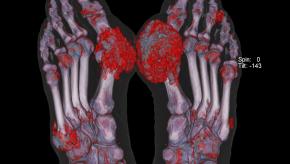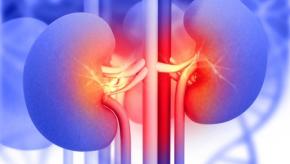All News
Scary Outcomes with Systemic Sclerosis Sine Scleroderma
The hallmark of systemic sclerosis is scleroderma, but less than 10% of SSc patients have sine scleroderma (ssSSc). A EUSTAR database review compared the manifestations and outcomes of ssSSC to limited cutaneous SSc and diffuse cutaneous SSc.
Read ArticleOpioids Ineffective in Acute Lower Back and Neck Pain
A randomised controlled trial including 347 participants with lower back or neck pain found there was no benefit of taking opioid pain relievers compared to placebo.
Read ArticlePredictors of Cardiovascular Events in ANCA-Associated Vasculitis
A large, retrospective, multinational study of patients with antineutrophil cytoplasmic antibody (ANCA)-associated vasculitis (AAV) shows they may be at risk for cardiovascular events (CVEs).
Read ArticleGut Microbiome Alterations in Lupus Patients
Recurrent bouts of systemic lupus erythematosus, marked by the body’s immune system attack of its own tissues, closely tracked with measurable upticks in growth in the gut of a certain species of bacteria.
Read ArticleParadoxical Psoriasis in Kids Taking TNF Inhibitors
A multicenter cohort study reported a large cohort of pediatric patients receiving TNF inhibitor therapy complicated by psoriasis, regardless of treatment indication or the specific TNF inhibitor.
Read ArticleHigh BMI Increases Arthritis Risk
Obesity carries many risks, now a new study in Arthritis & Rheumatology shows that higher body mass index (BMI) increases the risk for several rheumatic diseases, especially in women for both gout and psoriatic arthropathy.
Read ArticleWhat is Colchicine Worth? (6.23.2023)
Dr. Jack Cush reviews the news and reports from the past week on RheumNow.com. This week a new colchicine FDA approval, rising rate of IgG4 related disease and what's the safest biologic?
Read ArticleWhy Patients Don't Take Medicines
About 60% of adults aged 18 and over reported taking at least one prescription medication in 2021, with 36% reporting taking three or more. Out-of-pocket costs on retail drugs rose 4.8% to $63 billion in 2021.
Read ArticleFDA Approves Colchicine for CV Prevention
The FDA has approved colchicine (Lodoco) for cardiovascular prevention in adults with established atherosclerotic disease or multiple risk factors, making it the first anti-inflammatory medicine with such an indication.
Read ArticleTreatment Sequences Define Subphenotypes in RA Patients
An analysis of a large rheumatoid arthritis cohort sheds light on biologic disease-modifying anti-rheumatic drugs (bDMARDs) clustering that may be used in management, as certain clusters of b/tsDMARD correlated with disease activity over time.
Read ArticleCancer Risk From RA, Not the Drugs
While it is known that rheumatoid arthritis (RA) patients may be at risk for certain cancers, the question is which cancers and is this modified by therapy.
Read ArticleAbatacept Safety Outcomes Across 7 European Registries
A multinational registry analysis of rheumatoid arthritis (RA) receiving abatacept (ABA) has shown that the safety profile of ABA remains unchanged with no new or increased risks of infection or malignancy.
Read Article2023 EULAR Recommendations on Imaging in Crystal-Induced Arthritis
New recommendations on imaging for crystal-induced (gout, CPPD) arthritis (CiA) were presented at EULAR 2023 in Milan.
Read ArticleHow Often Do You Monitor MTX? (6.16.2023)
Dr. Jack Cush reviews the news and journal reports from this past week on RheumNow.com, including new drug approval, a new SpA variant and new rules for methotrexate (MTX) monitoring and depression screening.
Read ArticleHigher Genetic Loads Linked to Worse Systemic Lupus
A Korean study of a large systemic lupus erythematosus (SLE) cohort shows by genomic analysis, that higher weighted genetic risk scores (wGRS) is associated with earlier SLE onset, higher anti–Sm antibody positivity, lupus nephritis and more diverse lupus manifestations.
Read ArticleWhy Depression Screening Should be Mandatory at Each Visit
Depression is more widespread than ever in the United States, according to a new study from Gallup, showing that 18% of adults are depressed (or receiving depression treatment for depression) – an increase in 7 percentage points since 2015.
Read ArticleHigh Mortality Rates with Depression in Rheumatoid Arthritis
A Danish cohort study has shown a deadly association between depression and rheumatoid arthritis (RA).
Read ArticleDiagnostic Yield of Cranial and Large Vessel Imaging in GCA
Combined cranial and large vessel ultrasound and PET/CT provided excellent accuracy for the diagnosis of giant cell arteritis (GCA).
Read ArticleEULAR Offers Tips on Psoriasis Progression to PsA
Clinicians treating patients with psoriasis should be on the lookout for certain signs that joint involvement is likely to develop, according to a new "points to consider" documentopens in a new tab or window from the European Alliance of Associations for Rheumatology (EULAR).
Read ArticleTime to Risk Stratify Methotrexate Lab Monitoring?
A longitudinal cohort analysis has developed a prognostic model that informs a risk stratified approach to monitoring blood tests during long term methotrexate (MTX) therapy.
Read Article




















